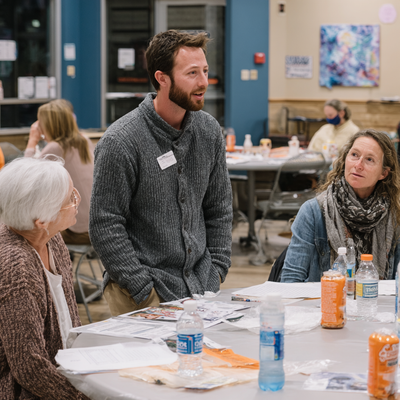So this woman comes up to me after service last week. Nice lady, new to church, wants to get involved.
"I'd love to help with children's ministry," she says.
"Great!" I say. "We always need people to help with kids."
"What would I be doing exactly?"
And I just... stood there. Like an idiot. Making these weird hand gestures trying to explain something I apparently can't explain.
"You know, just... helping. With the kids. During the thing."
The thing. I called children's ministry "the thing."
She smiled politely and said she'd think about it. That was a week ago. Pretty sure she's not thinking about it anymore.
Made me realize I have no idea how to describe what our volunteers actually do. Which is problematic when you're trying to recruit volunteers.
The "Helper" Disaster
Look at our volunteer board right now. Half the descriptions just say "Helper needed."
Helper for what though? Helping how? With what specific stuff?
I know what helpers do because I've been here forever and seen everything. But random person walking by? They probably think "helper" could mean anything from teaching lessons to mopping floors.
Asked three current volunteers what their job involves.
Sarah: "I mostly do snacks and make sure nobody dies." Linda: "I help with crafts and try to keep glue off everything." Tom: "I chase kids who escape during story time."
Same volunteer position. Three totally different answers.
No wonder people look confused when I try to explain these jobs.
When I Tried to List Everything
Wrote this massive description trying to cover every possible thing a volunteer might need to do.
"Assist with lesson preparation, room setup, snack distribution, bathroom supervision, craft management, behavior guidance, parent communication, supply organization..."
Went on for like twelve bullet points.
Showed it to potential volunteer and watched her face change with each line.
"Do I have to do all this?" she asked.
"Oh no, just whatever needs doing that day."
Which is the problem, right? "Whatever needs doing" isn't a job description. It's anxiety fuel.
The Opposite Problem
Tried going super simple next time.
"Sunday school volunteer: Help with elementary kids Sunday mornings."
Seemed better until someone actually read it and had questions.
How many kids? What ages exactly? What time? How long? Am I teaching or just watching? Do I need to prepare anything?
Turns out vague is worse than overwhelming. People want to know what they're signing up for before they sign up for it.
Skills Everyone Claims to Have
"Must love children and be patient."
Every volunteer description has this. Like we're screening out people who hate kids and have no patience.
Who's applying to work with children while actively disliking children? That's not a thing.
What about actual skills though? Can you handle six kids talking at once? Comfortable with bathroom emergencies? Able to manage craft time without having breakdown?
Real skills matter way more than personality traits everyone claims they have.
The Experience Thing
"Previous experience with children preferred."
What kind of experience? Parents have experience. Babysitters have experience. Teachers have experience. People who avoid children also have experience, just not the kind we want.
Plus what about people without formal experience who might be amazing with kids? Are we eliminating potentially great volunteers because they haven't worked with children professionally?
My best volunteer ever was retired guy who'd never worked with kids but turned out to be natural storyteller. Would've missed him if I'd been strict about experience requirements.
Time Confusion
"Sunday mornings" tells nobody anything useful.
What time Sunday morning? How long? Every Sunday or rotating? Just during service or including setup?
Had volunteer show up expecting to drop kids off and leave. Had another volunteer arrive two hours early thinking she needed to prepare everything.
Same job description, completely different expectations.
People can't plan appropriately if they don't know actual time commitments.
Authority Issues Nobody Talks About
What happens when kid acts up? Can volunteers make decisions or do they check with me about everything?
Can they send disruptive kids to parents? Handle bathroom situations? Deal with minor injuries?
Most descriptions don't mention authority levels. So volunteers guess about their decision-making power.
Some take charge of everything. Others won't do anything without permission first.
Both create problems in different ways.
My Attempt at Honesty
Tried writing description based on what volunteers actually experience.
"Elementary ministry volunteer: Manage 8-12 kids ages 6-10 during 45-minute program. Help with activities, supervise bathroom breaks, distribute snacks, redirect attention when kids get distracted. Some weeks involve messy crafts. Occasional behavior stuff - we'll teach you what works. No lesson prep needed, just willingness to engage with kids and back up lead teacher."
More specific. Also more honest about reality.
Showed it to potential volunteer. She said, "That sounds doable. When do I start?"
Honesty beats marketing every time.
What People Actually Wonder
How many kids am I responsible for? What exactly happens during those 45 minutes? Do I need to prepare anything beforehand? What if kid gets hurt or won't listen? Who do I ask when I don't know what to do? Can I watch first before committing?
Basic questions most descriptions ignore.
People want to feel prepared, not surprised by stuff they didn't expect.
Training That Actually Exists
Most descriptions mention training but don't explain what that means.
"Training provided" could be anything from five-minute overview to week-long certification program.
"You'll shadow experienced volunteer until you feel comfortable" gives clearer picture of support available.
People worry about being thrown into situations they can't handle. Especially with kids.
Real Volunteer Wisdom
Asked current volunteers what they wish they'd known before starting.
"Elementary kids are way louder than you expect." "Craft time requires patience you didn't know you needed." "Kids ask personal questions you're not ready for." "Bathroom breaks take forever and someone always needs help." "Snack time is basically controlled chaos."
Real insight about actual experience. Way more useful than generic requirements.
Resources Worth Checking
Some curriculum companies include realistic volunteer descriptions.
Orange has volunteer guides that address actual responsibilities and challenges instead of just listing ideal qualities.
Kids Sunday School Place explains specific tasks and realistic expectations.
Group's DIG IN includes volunteer resources that clarify roles without sugar-coating reality.
Grow Curriculum provides support materials that help people understand what they're actually signing up for.
Gospel Project connects volunteer roles to ministry purposes while being practical about requirements.
But best descriptions come from understanding what volunteers really do in your specific situation.
What Actually Works
Be specific instead of vague. "Help with craft projects" better than "assist with activities."
Honest about challenges. Kids get messy, loud, emotional. Volunteers should expect that.
Clear about time. Start time, end time, how often, how long commitment lasts.
Explain support available. Training, mentoring, who to ask for help.
Clarify authority levels. What decisions volunteers can make versus what requires checking first.
Let people observe before deciding. Seeing actual environment helps people make informed choices.
Ask current volunteers what job really involves and include that information.
Still working on better descriptions for everything. Turns out explaining something you do automatically is harder than it looks.
But worth figuring out if it helps people understand what they're actually volunteering for instead of just hoping it works out.








